PHUKET: The navies of the Asia-Pacific region are being crtiticised as men in uniform deal with the difficult task of protecting their homelands from the unwanted arrival of boatpeople.
Perhaps the greatest difference comes in the approaches of the Royal Australian Navy and the Royal Thai Navy.
While both have faced strong criticism, the RAN takes on its critics in public and explains what is happening.
The Royal Thai Navy, on the other hand, explains nothing and instead has now sued the media, using harsh and onerous laws to stifle reporting. The journalists face long jail terms.
The result: universal criticism that the Royal Thai Navy, regarded until now as a good organisation, is in this instance not defending democracy, but abusing it.
Comparing the two approaches gives some insights into how democracies are supposed to work.
While a navy captain can sue two Phuketwan journalists on behalf of the Royal Thai Navy - approximately 70,000 people - such a suggestion would be laughed out of court in Australia.
Instead, what happens in Australia is what should happen in Thailand: the leaders responsible for defending the Navy give media conferences and explain to the people who pay their wages, the public, what's happening.
So in recent days, Australia's Defence Minister, Scott Morrison, has been defending sailors against accusations that navy personnel inflicted burns on a group of African asylum seekers by making them hold hot parts of their boat's engine.
This week's claims of wrongdoing follow reports that Australian naval personnel have sworn at asylum seekers, handled them roughly and fired shots into the air while carrying out border protection operations.
On Monday, Australian Navy Chief Vice Admiral Ray Griggs issued his own statement.
''It is important that I place on the record my deep concern regarding the reporting over the last few weeks in both new and old media that discredits the conduct of members of the Royal Australian Navy in Border Protection Operations,'' he said.
While conceding that his organisation was not perfect, Vice Admiral Griggs said he was ''exceptionally proud of the men and women of our navy, particularly the way they serve on operations''.
''They serve at sea and ashore, at home and around the world, each and every day with great dignity and often with considerable courage,'' he said.
The same could clearly be said about Thailand's navy, if there was a leader in Thailand prepared to speak publicly about the navy and its role in repelling boatpeople.
An Australian navy captain could never sue members of the media for criminal defamation on behalf of all his colleagues because in Australia, defamation is a civil matter.
An Australian navy captain could never use the Computer Crimes Act against journalists because there is no such abhorrent legislation in Australia.
In Thailand, mystery surrounds the government's policy on boatpeople. There is no clarity on whether the Rohingya, driven out of Burma by racism and in some cases genocide, are also being abused in secret traffickers' camps inThailand.
Does the Royal Thai Navy ever arrest human traffickers? How do thousands of Rohingya mysteriously end up in secret jungle camps, where they are sometimes abused and beaten?
In Thailand, when approached for an explanation for the military suing the media, a vice admiral simply said: ''Let them explain themselves in court.''
Sadly, the Royal Thai Navy appears to have forgotten that its role is to defend democracy, not abuse it.
This is why, as journalists, we are preparing to go to jail rather than face trumped up charges that abuse media freedom and, when comparisons are made with other democracies, damage Thailand's reputation.
Full Rohingya Cartoon:
http://www.nationmultimedia.com/specials/nationphoto/show.php?id=30&pid=16667/
Navy Uses Computer Crimes Act to Sue:
http://phuketwan.com/tourism/navy-captain-uses-computer-crimes-act-sue-journalists-criminal-defamation-19413//
Phuket Reporters Prepared for Prison:
http://www.bangkokpost.com/news/local/387125/reporters-prepared-for-prison-in-navy-defamation-lawsuit/

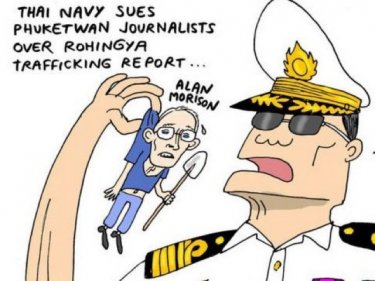


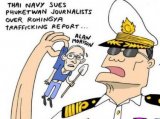
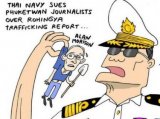

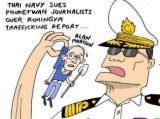






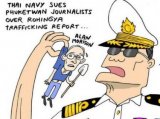
















You spend half your mouthing running down Australia and all about it, but as usual , when it suits you, as it does now, you turn things around and now defend their ideals to the hilt.You really do want your cake and eat it too..The master manipulator doing as he does best.
Posted by James on January 22, 2014 19:02
Editor Comment:
We can tell right from wrong, James, and there are times when Australia gets it right and times when Australia gets it wrong. Our brains still function properly. You're the only perfect one, and you have our sympathy.
We mere mortals have no way of telling whether Australian sailors have done the right thing or the wrong thing. But the system for dealing with criticism has it right. Ultranationalists, though, who believe their country's armed forces can do no wrong, leave us uninspired.